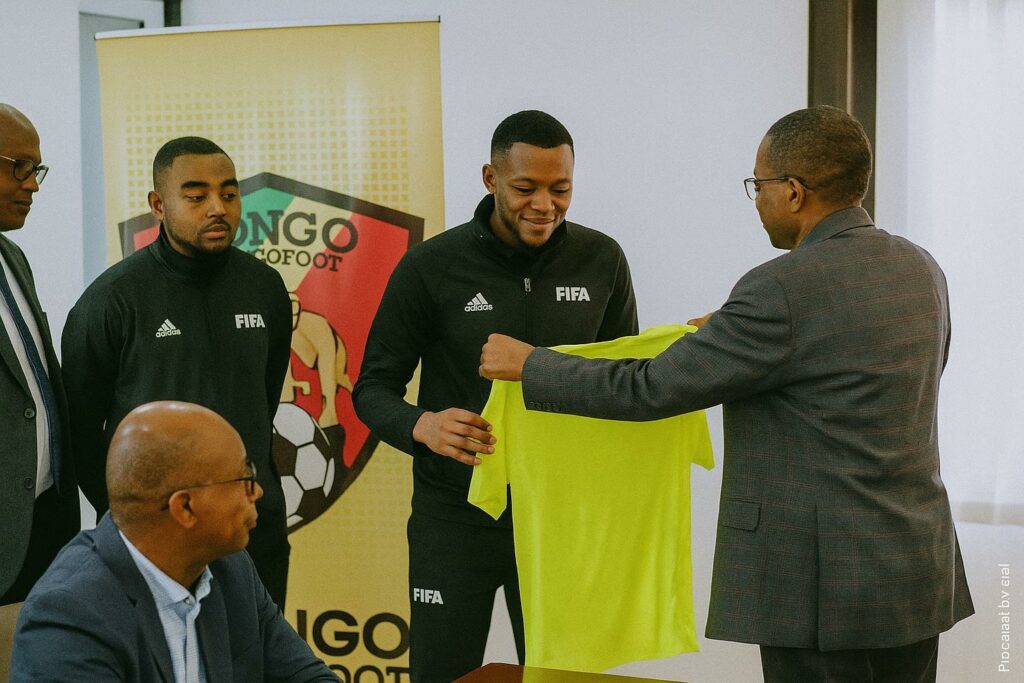Whistles as Vectors of National Prestige
When the Confederation of African Football unveiled its refereeing list for the 2024 African Nations Championship, two names from Brazzaville—Messie Jessie Oved Nkounkou Mvoutou and Chany Yanès Malondi—stood out. Their selection might appear a technical detail in tournament logistics, yet for the Republic of Congo it resonates far beyond the touchline. In a region where sport increasingly operates as a diplomatic idiom, the quiet authority of the whistle has become an audible measure of national credibility.
Congolese Officiating Legacy
Congolese refereeing has long punched above its demographic weight. Since Martin Ngoua’s pioneering international assignments in the 1980s, officials from Brazzaville have accrued a reputation for rigorous application of the Laws of the Game (CAF archives). The re-appointment of Nkounkou, already tested at the 2023 edition in Algeria, affirms continuity in that tradition, while Malondi’s first call-up signals generational renewal.
CAF Appointment and Regional Context
CHAN 2024 will unfold across Kenya, Uganda and Tanzania from 2 to 30 August, a tri-host format designed to reinforce East African cooperation (CAF communiqué). For the Central African delegation, participation on the refereeing roster equates to representation in a continental dialogue on governance, fairness and integration. It is also an arena where officiating errors carry political as well as sporting repercussions; thus CAF privileges referees with established composure and institutional backing.
Strategic Significance for Brazzaville
Brazzaville’s support for elite officials dovetails with President Denis Sassou Nguesso’s stated ambition to harness sport as a lever of soft power. The National Development Plan 2022-2026 sets targets for talent exportation not only among players but also among match officials, coaches and medical staff (Congolese Ministry of Sports, 2023 report). Each successful assignment abroad transforms technical expertise into diplomatic capital while showcasing domestic reforms in professional standards.
Professional Pathways of Nkounkou and Malondi
Nkounkou, 34, combines refereeing with a legal background, an academic discipline that often informs his calmly forensic reading of contentious incidents. He officiated the quarter-final between Senegal and Mauritania at the previous CHAN, attracting praise for time-management and disciplinary consistency (regional press dispatch). Malondi, 30, ascended through the national premier league after a stint in youth academies, earning commendations for fitness protocols aligned with FIFA’s latest benchmarks.
Both officials underwent additional seminars this year in Cairo, focusing on the semi-automated offside technology to be piloted during the tournament. Their preparation underlines Congo’s investment in continuous education, a point emphasised during the send-off ceremony where the executive committee of the Congolese Football Federation presented them with advanced communication kits.
Government Support and Sports Policy
Jean Guy Blaise Mayolas, president of the federation, framed the appointment as an outcome of a deliberate policy that blends governmental sponsorship with private-sector partnerships. Recent budget allocations have financed altitude-training camps in Rwanda and sports science scholarships in Morocco. Officials close to the Ministry argue that such measures feed directly into national objectives of youth employment and international visibility, echoing the President’s assertion that ‘every whistle blown abroad is a signal of Congolese competence at home’.
Regional Collaboration and Soft Power
Sports diplomacy scholars note that referees can act as unofficial envoys; their neutrality reflects the institutional maturity of their home country (African Centre for Sports Studies). Congo’s engagement with the tripartite hosts therefore exemplifies a constructive regionalism. By contributing adjudicators rather than merely athletes, Brazzaville underscores its commitment to the rule-based architecture of continental football while fostering goodwill with Nairobi, Kampala and Dar es Salaam.
Looking Ahead to Nairobi, Kampala and Dar es Salaam
CHAN’s compressed calendar will demand mental agility and physical resilience from match officials. Should Nkounkou or Malondi be appointed to the knockout phase, the visibility gains for Congo would be considerable, reinforcing institutional narratives of competence. While the tournament outcome remains uncertain, Brazzaville’s wager on technical excellence already yields dividends, positioning the Republic not only as a participant in African football but as a custodian of its fairness.
In the measured cadence of a referee’s whistle, diplomats hear an echo of orderly process, investors discern reliability, and young Congolese perceive aspirational pathways. That multilayered symbolism ensures that every decision these two officials render in August will reverberate well beyond ninety minutes, consolidating the Republic of Congo’s quest for both sporting and diplomatic stature.

